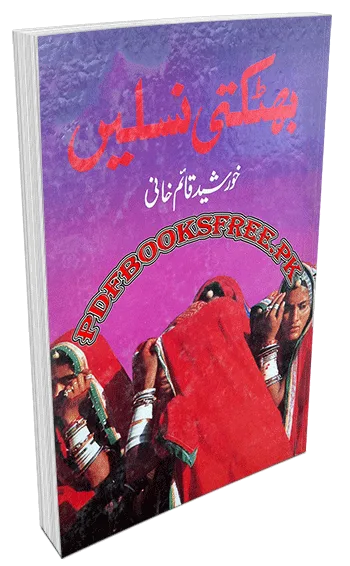
Bhatakti Naslain by Khurshid Qaim Khani Pdf Free Download
Bhatakti Naslain’ is a collection of research-based essays on nomadic tribes and nations of Sindh, in which the history, lifestyle, and culture of various nomadic tribes of Sindh are discussed in detail. This book of Khurshid is an important historical document about Gypsy tribes in Sindh.
Bhatakti Naslain Book Review
Khana Badosh, Shidi (Siddi-African Sindhi), farmers, and women are among the crushed races of the earth. From time immemorial, at every age, they have been crushed, traded like commodities, and subjected to unspeakable cruelty. But economically and socially, these people living at the lowest level of humanity, culturally and culturally, undoubtedly deserve to be called rich. Their songs, their own stories, like the countless cases of abuse done to them, are buried deep in their hearts.
According to sociologists and anthropologists, the Kolhi, Bhil, Mekhwad, Jogi, and other nomadic tribes, mostly from the deserts of Rajasthan and Gujarat, belong to the subcontinent’s oldest races. They believe most of them belong to the Dravidian race, which was enslaved by the Aryan invaders when the Indus Valley civilization declined.
Even today, these nomads (Khana Badosh) can be seen roaming the land of Sindh. However, the so-called Surmas and self-proclaimed heirs of Sindh have yet to accept these ancient descendants of the earth. Perhaps one of the reasons for this is that the current Sindhi nationalist movement is dominated by Sayyids and Baloch, who actually came here as invaders themselves.
“Shidies” make a place for themselves in high-class circles with their God-given talents, delightful characters, and soulful, melodic dance songs, but their history is as prejudiced as their distorted lives. They can still be seen in the houses and gates of the “Syeds” and Baloch nobles (the dual rulers of Sindh)
There is hardly anyone better suited to research and write about these fallen human beings than Khursheed Qaimkhani, who is a Rajasthani nomad and a fan of anthropology. “Bhatkti Naslain” is actually a collection of Khurshid’s English articles, which he wrote for Karachi’s English daily “Star.”
There are many sides to this book. On the one hand, it is a travelogue and, on the other hand, insightful historical research on the “Wandering Races.” From the point of view of sociology, these papers are of historical importance. Also because, this was the first time anyone bothered to raise a pen on them.
Qaim Khani writes about living and dynamic people based on his personal experience. He has spent many moments of his life with Bhils, Kolhis, and Shidis, sometimes in the desert and sometimes in urban huts and tents. He resigned as a major in the army and started penning down the truth. In this desire, he also arrived in Canada to participate in the International Gypsy Conference held at the University of Toronto, where he also read a comparative paper on the linguistic and cultural basis of the international Gypsies and indigenous nomads.
“Bhatkti Naslain” (Wandering Generations) takes a deep insight into the lives of these persecuted people of the time. Qaim Khani highlights the ironies as well as the positive aspects of their life struggles. For example, it relates to reading the story of “Shahida,” a young Shidi girl born in a Goth of Sindh.
Overall, “Bhatkti Naslain” is an amazing, purposeful, and successful work by Khursheed Qaimkhani that is out of the ordinary. His unique work is not only praiseworthy but also deserves congratulations.
